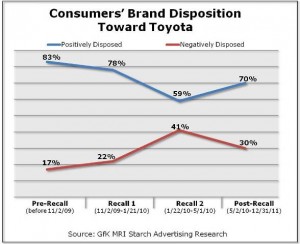While the goal of a running a business is to thrive and profit off of the lowest possible investments, a company without a foundational customer base has no chance of surviving in the market. That being said, when the main and, often, only concern is to make a significant amount of money, companies tend to hurt their own customers and stain their reputations.
In 2010, following a recall of millions of vehicles, Toyota admitted to delaying a rule for tougher door locks and phasing in side air bags, which, in total, saved the company over $135 million. Toyota then faced a vast decrease in customers, dropping 11% in customer loyalty and 42% in first-time buyers. As shown in an article published by Forbes Magazine, positively disposed consumers decreased by 59%, while negatively disposed consumers increased by 41%. Clearly, this single action forced many of Toyota’s customers to reconsider purchasing Toyota-produced cars due to safety concerns.

This incident shows the importance of customer loyalty and how a single, unethical action can turn the tide. Indeed, companies need big profits to compete, but at the same time, they need their customers to financially back them. In my opinion, Milton Friedman’s ideology on business ethics is accurate; success in the business world must stay within the “rules of the game.” However, it’s how these rules are defined, respecting the safety of consumers and workers, that should be emphasized.
Images and References:
http://sloanreview.mit.edu/article/what-really-happened-to-toyota/
http://www.forbes.com/sites/annemariekelly/2012/03/05/has-toyotas-image-recovered-from-the-brands-recall-crisis/